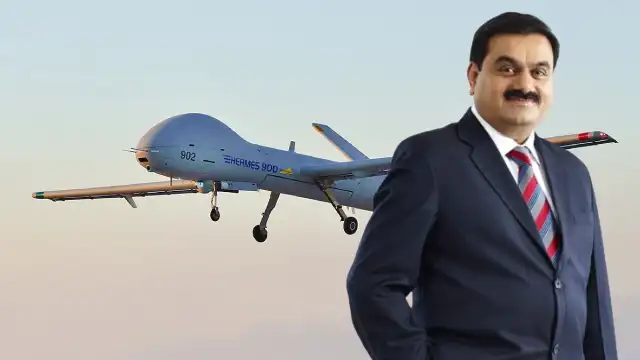The left-wing Palestinian resistance organisation Popular Front for the Liberation of Palestine (PFLP) issued a blistering condemnation of Elbit Systems on April 21st. The Palestinian resistance organisation called for global action against the arms manufacturer.
“The Popular Front for the Liberation of Palestine calls on the free peoples, organisations, and solidarity movements of the world to take urgent action to besiege Elbit Systems,” the statement read. It accused the company of being “directly involved in the Zionist war of extermination against our people in the Gaza Strip.”
The PFLP cited Elbit’s Skystriker suicide drone as evidence of the company’s complicity in Israel’s Gaza aggression. “The occupation army’s use of the Skystriker suicide drone, manufactured by this company, to carry out cold-blooded crimes targeting civilians confirms the depth of the complicity between the Zionist military establishment and international arms companies,” the statement continued.
The Marxist-Leninist resistance group placed responsibility beyond Israel. “Countries such as the United States, Britain, Australia, Germany, and others also bear full responsibility for these crimes, as they are partners in Elbit,” the PFLP declared.
Its demands were unequivocal. The organisation called for protests at Elbit offices worldwide. It urged governments to “shut down the company and sever ties with it.” The PFLP also demanded that “the International Criminal Court prosecute the company’s management as war criminals.”
The Adani-Elbit partnership
While protesters face arrest in Britain and elsewhere, Elbit enjoys relative calm in India. Its joint venture with Gautam Adani‘s conglomerate operates with minimal public opposition.
The partnership runs deep. Adani Defence and Aerospace and Elbit Systems jointly manufacture unmanned aerial vehicles through their venture, Adani Elbit Advanced Systems India Limited.
Their crown jewel is the Hermes 900 drone production facility in Hyderabad. It represents the only such facility outside Israel itself.
These are not innocuous aircraft. Mr Adani’s own marketing materials describe the Hermes 900 as a “combat-proven multi-role unmanned platform.” The drone has reportedly been used extensively in Gaza since October 2023.
Beyond drones: Weapons web
The Adani-Elbit relationship forms just one strand in a wider weapons web. Mr Adani’s defence business has forged multiple partnerships with Israeli defence firms.
In 2018, Adani announced a joint venture with Israel Weapon Industries. The resulting company, PLR Systems (standing for “Precise, Lethal, Reliable”), manufactures assault rifles and machine guns.
Some of these weapons reportedly include the TAVOR and X95 assault rifles, GALIL sniper rifles, and UZI submachine guns. Adani Defence holds a controlling 51% stake in this venture.
The collaboration has since expanded into artificial intelligence. In October 2022, the partners unveiled “India’s first AI-based firing system” at Gujarat’s DefExpo 2022.
Adani-Modi nexus
Adani’s Israeli partnerships flourish amid allegations of close ties to Prime Minister Narendra Modi‘s government. Critics point to a symbiotic relationship between the conglomerate and India’s ruling far-right Bharatiya Janata Party (BJP).
Both Mr Adani and Mr Modi hail from Gujarat, where the businessman’s rise has paralleled the politician’s ascent. Opposition parties have frequently highlighted these connections, especially the impunity with which Mr Adani operates.
Yet these criticisms have failed to generate significant public pressure. Unlike in Britain, where Elbit protesters face legal consequences, India has seen little organised resistance.
Haifa connection
Mr Adani’s Israeli connections extend beyond weapons manufacturing. In January 2023, the port-to-power conglomerate acquired a 70% stake in Israel’s Haifa port.
The $1.6bn deal provided substantial funds to the Israeli state
It also positioned Adani Enterprises strategically near Lebanon’s southern border.
This acquisition represents one of India’s largest investments in Israel. Many observers view it as evidence of deepening ties between Mr Modi’s government and Israel.
Moreover, when Mr Modi participated in the inaugural meeting of the India-Middle East-Europe Economic Corridor (IMEC), during the G20 Summit held in New Delhi, the reason behind Mr Adani’s acquisition of Haifa Port became clear.
The Haifa Port is considered a key gateway for the IMEC project, connecting West Asia with Europe.
Mr Adani’s acquisition of the port, much before the IMEC project deal was proposed, indicates his influence on government policies.
Hindu nationalism and Zionism
Mr Adani’s partnerships with Israeli defence firms, including Elbit Systems, reflect broader ideological alignments. Mr Modi’s BJP has cultivated close relations with Israel due to their shared ideology.
Both Hindu nationalism and Zionism share certain characteristics. Each emphasises religious identity in politics. Both movements have been accused of marginalising minorities.
This ideological affinity helps explain the relative silence surrounding Elbit’s Indian operations. While protesters worldwide target the arms manufacturer, India’s political climate remains hospitable.
No opposition to Elbits Systems
India’s established Opposition has struggled to challenge the Adani-Elbit relationship effectively. Despite occasional rhetorical criticism, no substantial movement has emerged.
Left and progressive forces have failed to mobilise around the issue as well. This stands in contrast to countries like Britain, where anti-Elbit protests have gained traction despite official pushback.
The absence of meaningful opposition allows the joint venture to continue largely unimpeded. Hermes 900 drones roll off production lines in Hyderabad while their counterparts kill in Gaza.
The global context
Elbit Systems operates in a complex international environment. As Western protests intensify, the company increasingly relies on partners in friendlier jurisdictions.
India represents an ideal sanctuary. Its government maintains warm relations with Israel. Its dominant corporate players seek military technology. Its opposition remains fragmented.
This arrangement proves mutually beneficial. Elbit gains manufacturing capacity and market access. Adani acquires technical expertise and political capital. Both profit financially.
Yet as the PFLP’s statement suggests, Elbit’s activities remain controversial. The company faces growing scrutiny over its role in Gaza. The weapons it produces—including those manufactured in India—continue to kill Palestinian civilians.
For now, however, Elbit’s Indian operations continue unchallenged. While protesters worldwide demand accountability, the company’s partnership with Adani demonstrates how corporate interests, political alignments, and ideological affinities can shield arms manufacturers from scrutiny.
Join our channels on Telegram and WhatsApp to receive geopolitical updates, videos and more.







